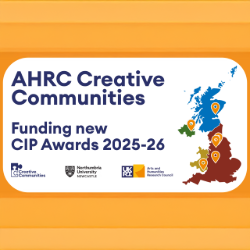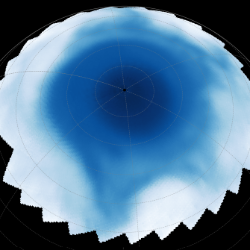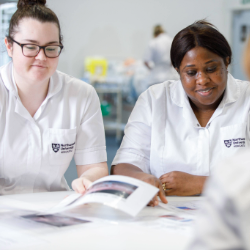-
Study
-
Undergraduate
- UCAS Clearing & Confirmation 2025
- Application Guides
- UCAS Exhibitions
- Foundation Years
- School & College Outreach
- Information for Parents
-
Postgraduate
- Application Guide
- Postgraduate Research Degrees
- Flexible Learning
- Change Direction
- Register your Interest
-
Student Life
- Students' Union
- The Hub - Student Blog
- Accommodation
- Northumbria Sport
- Support for Students
-
Learning Experience
- Real-World Learning
- Research-enriched learning
- Graduate Futures
- The Business Clinic
- Study Abroad
-
-
International
International
Northumbria’s global footprint touches every continent across the world, through our global partnerships across 17 institutions in 10 countries, to our 277,000 strong alumni community and 150 recruitment partners – we prepare our students for the challenges of tomorrow. Discover more about how to join Northumbria’s global family or our partnerships.
View our Global Footprint-
Quick Links
- Course Search
- Undergraduate Study
- Postgraduate Study
- Information for Parents
- London Campus
- Northumbria Pathway
- Cost of Living
- Sign up for Information
-
International Students
- Information for International Students
- International Events
- Application Guide
- Entry Requirements and Education Country Agents
- Global Offices
- English Requirements
- English Language Centre
- International student support
- Cost of Living
-
International Fees and Funding
- International Undergraduate Fees
- International Undergraduate Funding
- International Masters Fees
- International Masters Funding
- International Postgraduate Research Fees
- International Postgraduate Research Funding
-
International Partners
- Agent and Representatives Network
- Global Partnerships
- Global Community
-
International Mobility
- Study Abroad
- Information for Incoming Exchange Students
-
-
Business
Business
The world is changing faster than ever before. The future is there to be won by organisations who find ways to turn today's possibilities into tomorrows competitive edge. In a connected world, collaboration can be the key to success.
More on our Business Services -
Research
Research
Northumbria is a research-rich, business-focused, professional university with a global reputation for academic quality. We conduct ground-breaking research that is responsive to the science & technology, health & well being, economic and social and arts & cultural needs for the communities
Discover more about our Research-
Quick Links
- Research Peaks of Excellence
- Academic Departments
- Research Staff
- Postgraduate Research Studentships
- Research Events
-
Research at Northumbria
- Interdisciplinary Research Themes
- Research Impact
- REF
- Partners and Collaborators
-
Support for Researchers
- Research and Innovation Services Staff
- Researcher Development and Training
- Ethics, Integrity, and Trusted Research
- University Library
- Vice Chancellors Fellows
-
Research Degrees
- Postgraduate Research Overview
- Doctoral Training Partnerships and Centres
- Academic Departments
-
Research Culture
- Research Culture
- Research Culture Action Plan
- Concordats and Commitments
-
-
About Us
-
About Northumbria
- Our Strategy
- Our Staff
- Our Schools
- Place and Partnerships
- Leadership & Governance
- University Services
- History of Northumbria
- Contact us
- Online Shop
-
-
Alumni
Alumni
Northumbria University is renowned for the calibre of its business-ready graduates. Our alumni network has over 250,000 graduates based in 178 countries worldwide in a range of sectors, our alumni are making a real impact on the world.
Our Alumni - Work For Us
What will I learn on this module?
This is an experiential learning module that is based on a residential fieldtrip, where you will conduct qualitative and quantitative research on tourism and events. The module introduces you to the process of fieldwork equipping you with basic research skills. In preparation for the trip, you will be introduced to the main methodologies and methods of data collection to include surveys, ethnographic observational work, interview techniques, experimental, mobile and visual methods. Once in the field, you will conduct primary research on a topic concerning tourism and events planning, experience, motivation and/or host-guest relationships. Having direct involvement in data collection and analysis in the social environment of tourism and events, will be essential experience to develop critical awareness and intellectual agility to deal with the ethical, social, environmental issues that influence the planning design and delivery of the tourism and events product.
You will learn about research and inquiry skills and techniques both in class and in the field by studying a range of research methods, with an emphasis will be on research processes and application. The module adopts a student-centred approach to learning, where you will develop an understanding of research through your active involvement in studying, designing and conducting research. This module will prepare you for some of the advanced research-based work at level 6 in the dissertation and consultancy projects, adding value to the learning and teaching of research methods for final dissertation work. Assignments will include a group fieldwork research project, and an individual essay that will critically review relevant literature as well opportunity for critical analyse the empirical work undertaken in the field.
How will I learn on this module?
N/A
How will I be supported academically on this module?
N/A
What will I be expected to read on this module?
All modules at Northumbria include a range of reading materials that students are expected to engage with. Online reading lists (provided after enrolment) give you access to your reading material for your modules. The Library works in partnership with your module tutors to ensure you have access to the material that you need.
What will I be expected to achieve?
Knowledge & Understanding:
1. Demonstrate a critical understanding of the concepts underpinning innovation, creativity and creative processes and in a variety of settings.
2. Apply theoretical concepts relating to innovation and creativity to real world problems in order to develop solutions
Intellectual / Professional skills & abilities:
3. Reflect on personal capabilities for creative work and how this can be enhanced through teamwork
4. Develop an awareness of how creative and problem solving processes are implemented in culturally diverse groups
Personal Values Attributes (Global / Cultural awareness, Ethics, Curiosity) (PVA):
Develop a sense of curiosity and willingness to experiment with new ideas to meet the needs of different social and environmental contexts
How will I be assessed?
Formative assessment:
The taught sessions will be interactive and will require students to participate in groupwork and do short informal presentations on the results of groupwork with informal feedback from tutors and other students.
A major groupwork project will be to undertake a creative project addressing an issue identified by the tutor. Students may use a variety of approaches to address the issue and will have to do a group presentation on their findings.
Formative feedback will be provided by tutors and peers in these sessions which will assist students in developing their understanding of the themes and reflecting on their learning.
Summative assessment:
The summative element of the assessment is made up of two components.
Individual Assessment: Students will develop a 3000 word case study report of creativity or innovation in an identified organisation. This assesses learning outcomes 1, 2, 3 and 4
Second Component: A group presentation that will assess learning outcomes 1, 2, 3, 5. This will relate to experiential learning activities on the fieldtrip.
Pre-requisite(s)
N/A
Co-requisite(s)
N/A
Module abstract
This hands-on module will introduce you to the process, pace and production of a piece of field research, equipping you with fundamental
research skills. You’ll go on a residential field trip, where you’ll have the opportunity to do conduct empirical research on tourism and events. In
preparation for the trip, you’ll learn about key data collection techniques including ethnography, surveys, interviews and visual methodologies.
Once in the field, you’ll use your practical and research skills to conduct primary research on tourism and events planning, experiences,
motivations and/or host-guest relationships. This will also give you the chance to reflect on the ethical, social and environmental issues that are
attached to tourism and events management. By the end of the module, you’ll be prepared for most advanced, research-based work at level 6.
Course info
UCAS Code N805
Credits 20
Level of Study Undergraduate
Mode of Study 3 years Full Time or 4 years with a placement (sandwich)/study abroad
Department Newcastle Business School
Location City Campus, Northumbria University
City Newcastle
Start September 2026
All information is accurate at the time of sharing.
Full time Courses are primarily delivered via on-campus face to face learning but could include elements of online learning. Most courses run as planned and as promoted on our website and via our marketing materials, but if there are any substantial changes (as determined by the Competition and Markets Authority) to a course or there is the potential that course may be withdrawn, we will notify all affected applicants as soon as possible with advice and guidance regarding their options. It is also important to be aware that optional modules listed on course pages may be subject to change depending on uptake numbers each year.
Contact time is subject to increase or decrease in line with possible restrictions imposed by the government or the University in the interest of maintaining the health and safety and wellbeing of students, staff, and visitors if this is deemed necessary in future.
Useful Links
Find out about our distinctive approach at
www.northumbria.ac.uk/exp
Admissions Terms and Conditions
northumbria.ac.uk/terms
Fees and Funding
northumbria.ac.uk/fees
Admissions Policy
northumbria.ac.uk/adpolicy
Admissions Complaints Policy
northumbria.ac.uk/complaints








